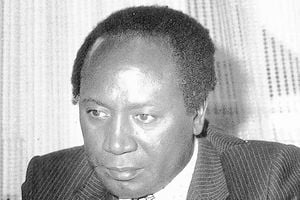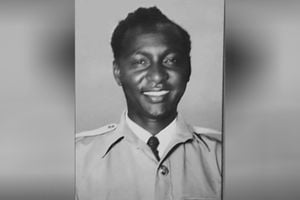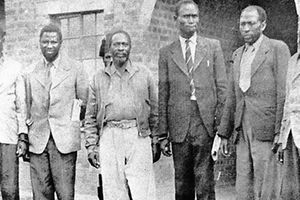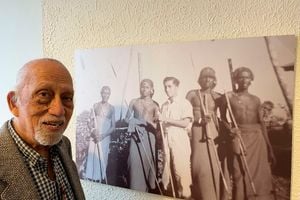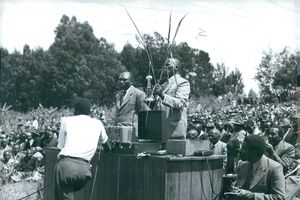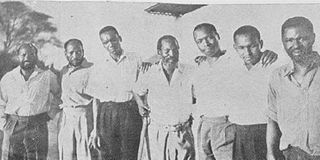
Daniel Moi (third right) with Kapenguria Six members Jomo Kenyatta (centre), Paul Ngei, Kung’u Karumba, Bildad Kaggia, Achieng’ Oneko and Fred Kubai. They were members of the Kenya African Union that later rebranded to Kanu.
My name is Mervyn Maciel and as I approach my 95th birthday, I am writing a series of articles for the Weekly Review on my experiences and encounters with remarkable people during almost 20 years in Kenya’s colonial-era civil service from 1947. In this fourth instalment, I write about interactions with Kenya’s freedom fighters, including the Kapenguria Six
During my service in Marsabit in the 1950s I met some political detainees whose movements were restricted to the area.
Unfortunately, I did not have direct contact with all of them.The ones I saw only casually were Jesse Kariuki, who was from Central Kenya, and Elijah Masinde of the Dini ya Msambwa sect based in Western Kenya.
I shall comment briefly on the ones I actually met and interacted with. The one who comes immediately to mind is Ramogi Achieng Oneko who was part of the now famous ‘Kapenguria Six’ independence heroes, who were arrested in 1952.
He, along with Jomo Kenyatta, Fred Kubai, Paul Ngei, Bildad Kaggia and Kungu Karumba were charged with being behind the Mau Mau freedom fighters at the hastily converted Court in Kapenguria where I had been seconded from my post at Kitale.
I saw the Kapenguria Six each morning. The Prison they were housed in was behind my government quarter, and each morning as they were taken to the court house, they used to pass my quarters. Some of these men were later to become prominent ministers in the first Kenyatta government.
In Marsabit, whenever there was no European District Officer, and due to the District Commissioner’s frequent absences to attend to other issues, I, a mere Bwana Karani (clerk) at the time, was given the task of visiting all the political detainees and also the government prison on a weekly basis. In the latter case, all I did was to see the corporal in charge and attend to any grievances the prisoners may have had.
They were not detained in a Prison but in a guarded government building. When I visited the political detainees, Ramogi Achieng Oneko always acted as their spokesman.
In addition to him, I remember Waira Kamau, Mwinga Chokwe and others whose names escape me now. The rest of the Kapenguria Six were in Lokitaung, Turkana.
I found Oneko a very friendly individual who initially must have been surprised to see me as he must have been expecting the European DC! Oneko would list any grievances individual political prisoners had.
This included not being happy with their diet, or wanting additional blankets because of the cold weather surrounding Marsabit mountain and so on.
He would also hand me letters the prisoners had written to their families. These I would later look at on the DC’s behalf and post. I can’t remember ever having any reason to stop their letters as these were all of a friendly family nature.
I similarly censored all their incoming mail and here again, I posted them without any problems since there were no political issues raised in any of them – just normal family issues like how much they were missing their loved ones and hoping that they were being well treated.
On returning to my office, and on the DC’s return from safari, I would submit a brief report to him outlining what I had encountered during such inspections. He would then deal with any contentious issues himself.
Whenever he was around, he always carried out such inspections himself. Although such duties were outside my normal post, I received no additional remuneration for the extra responsibilities I was asked, on occasions, to undertake! I would later be transferred to South Nyanza.
Years later, I was to meet Oneko again after independence when he was invited as a guest of honour at our social club – the Goan Institute in Nakuru.
He was then the Information minister and enjoyed himself at the event, even taking to the floor to dance with one of the ladies! As always, we all had a lovely time as I am sure everyone is aware that we, Goans, are social animals who love our singing and dancing! Oneko, with his tall stature and calm personality, cut an interesting figure at our social event, and I can still remember how happy and comfortable he seemed with us Goans. (After all, remember he was a great friend of my own friend, Pio Gama Pinto — independent Kenya’s first martyr, who was assassinated in 1965).
Senior Chief Mbiyu Koinange
Talking of Pio Gama Pinto again - I was unaware of the fact that he had travelled to Marsabit to give the detainees something they badly needed: a radio. Thanks to my dear friend, Woche Guyo of Marsabit, I was made aware of this. Pio’s generosity towards his fellow prisoners knew no bounds as was evident during his time on Manda Island. Another political detainee I met fairly regularly was ex-Senior Chief Mbiyu Koinange. I could never understand why this elderly man was always brought to my office under Police escort.
For a frail and visibly harmless individual, I could not understand why he had to undergo such humiliation. To me, he seemed such a gentle and kind man who used to come to my office every month to collect his government pension, always smiling despite his present restricted status. I must mention the fact that I found him so kind when he even went so far as to offer me money for my help. I could never accept a penny from him seeing what I was doing was actually my job for which I was paid! But such was the personality of this old man who was kindness personified!
To this day, I can recall his friendly and smiling face. The final detainee I met was Mwangi Macharia who, with Kubai and Makhan Singh, was heavily involved in the trade union movement. Mwangi turned out to be a model political prisoner – a man who could put his hands to almost anything. He was a great handyman, whose talents didn’t go unnoticed at a time when arrangements were being made for the installation of a piped water supply in the boma.
As I’ve said earlier, Mwangi was very good with his hands and in no time, despite his detainee status, the government decided to take him on as a plumber and pay him. I was pleased when I heard this since Mwangi and I were good friends and he always helped me out if I needed anything around the house. Laying a pipeline in Marsabit was no easy task at the time as the area to be covered was home to herds of elephants who lived around Marsabit Mountain.
There were also buffaloes to contend with, but in about a year’s time, Marsabit boma had a piped water supply – thanks largely to Mwangi and his workmen, mostly from Meru. What a relief it was to us, the staff, who no longer had to wait for the prisoners to roll a drum of water to our government quarters each time.
The station staff were also pleased but I’ll never forget how Mwangi, and the workmen risked their lives as the elephants were quite a danger. Marsabit had quite a sizable elephant population and I can still recall how my garden was visited every night by the animals.
On occasions, I even encountered buffalo when using the outside toilet at night since we had no indoor sanitation at the time! Mwangi’s shamba of maize and beans was regularly plundered by invading elephants.
I can’t help mentioning the fact that when my younger brother, Wilfred — an advertising executive by profession but also a freelance journalist — was imprisoned in the Congo, who should he meet in prison but my good friend Mwangi? Thinking that it was me, Mwangi gave my brother a warm hug only to be told later who he actually was!
Later my brother also gave Mwangi his jacket as Mwangi had the bare minimum of clothing on him. Years later, when I flew to Nairobi to organise the funeral of my brother, Wilfred, who was killed in a road accident on the Thika road, I was pleasantly surprised to meet Mwangi when walking along one of Nairobi’s main streets.
Recognising me as a lost friend, he greeted me warmly with a hug – an occasion I have never forgotten. Mwangi Macharia has left me with many memories of our time in Marsabit together. I can still recall his friendly attitude and his ready smile.

